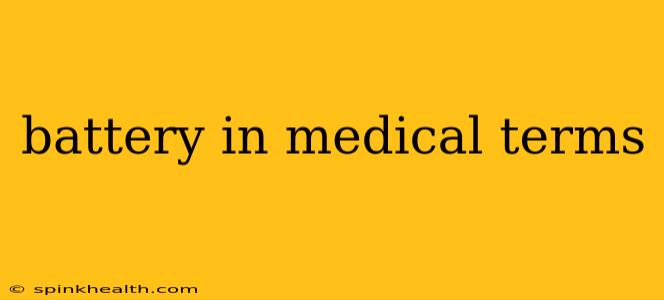The term "battery" in medical contexts holds a significantly different meaning than its everyday usage. While colloquially, a battery is a power source, in medical law and ethics, it refers to a harmful or offensive touching of another person without their consent. This subtle difference carries weighty legal and ethical implications for healthcare professionals. Let's delve into this critical distinction and explore related questions.
What constitutes battery in a medical context?
Medical battery occurs when a healthcare provider performs a medical procedure or treatment on a patient without their informed consent. This isn't just about a lack of a signed consent form; it's about the patient's genuine understanding of the procedure, its risks, and available alternatives. Imagine a surgeon operating on the wrong leg – that’s a clear case of battery. But even seemingly minor procedures, like administering an injection without explicit consent, can constitute battery. The key element is the absence of a freely given, informed agreement.
What is the difference between battery and negligence in medical malpractice?
This is a crucial distinction. Negligence involves a failure to meet the standard of care expected of a reasonable healthcare professional, potentially leading to harm. For example, a doctor misdiagnosing a condition and providing the wrong treatment might be considered negligence. Battery, on the other hand, is about the lack of consent itself, regardless of whether the procedure was performed correctly or resulted in harm. A perfectly executed procedure performed without consent is still considered battery. A case can involve both negligence and battery; for instance, a surgeon might perform an incorrect procedure (negligence) without the patient's consent (battery).
What are the legal consequences of medical battery?
The consequences of medical battery can be severe. Patients who can successfully prove medical battery can sue for significant damages, including:
- Compensatory damages: These cover medical expenses, lost wages, pain, and suffering directly resulting from the battery.
- Punitive damages: These are intended to punish the healthcare provider for their actions and deter similar behavior in the future. They are typically awarded in cases where the battery was particularly egregious or intentional.
The legal ramifications extend beyond financial penalties. A finding of medical battery can severely damage a healthcare professional's reputation and career. Licensing boards may take disciplinary action, leading to suspension or revocation of medical licenses.
How can medical professionals avoid accusations of medical battery?
The cornerstone of avoiding medical battery is obtaining truly informed consent. This involves:
- Clear and understandable explanation: The procedure, its purpose, benefits, risks, alternatives, and potential complications should be explained in language the patient can grasp.
- Opportunity for questions: The patient should have ample opportunity to ask questions and receive clear answers.
- Documenting consent: Meticulous documentation of the consent process, including the date, time, and specifics discussed, is vital.
- Respect for patient autonomy: The patient's right to refuse treatment, even if it's in their best medical interest, must be respected.
What are some examples of medical battery?
Besides the surgical examples already mentioned, medical battery can include:
- Administering medication without consent.
- Performing a physical examination beyond what was agreed upon.
- Taking photographs or videos of a patient without their permission.
In all instances, the absence of informed consent is the defining factor.
In conclusion, understanding "battery" in the medical context requires moving beyond its common definition. It's a critical legal and ethical concept that emphasizes the patient's right to autonomy and informed decision-making in their healthcare. Healthcare providers who prioritize informed consent and patient rights are best positioned to avoid the serious legal and professional repercussions of medical battery.

